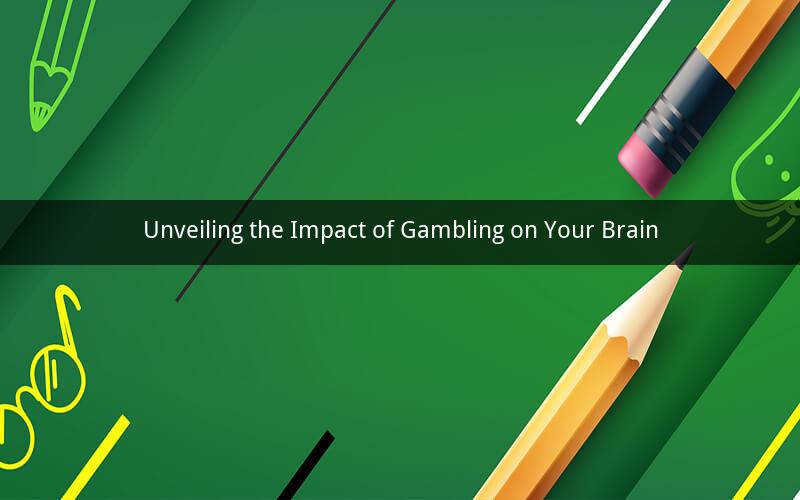
Introduction:
Gambling has been a prevalent activity throughout history, captivating individuals from all walks of life. While it may seem like a harmless form of entertainment, the truth is that gambling can have profound effects on the human brain. This article delves into the various ways in which gambling alters brain functions, exploring the potential consequences and implications.
1. The Dopamine Rush: Reward and Addiction
One of the most significant impacts of gambling on the brain is the release of dopamine, a neurotransmitter associated with pleasure and reward. When a person wins a bet, the brain experiences a surge of dopamine, creating a sense of exhilaration and satisfaction. This rush can become addictive, as the brain craves the same sensation with each successful gamble. Over time, the brain's reward system can become desensitized, leading to an increased need for larger wins and more frequent gambling to achieve the same dopamine rush.
2. Decision-Making Impairment
Gambling involves making rapid decisions under uncertainty. However, repeated exposure to gambling can impair the brain's ability to make rational decisions. The prefrontal cortex, responsible for executive functions such as decision-making and impulse control, may become less efficient due to the constant engagement with gambling-related tasks. This can manifest as difficulties in other areas of life, such as work, relationships, and financial management.
3. Cognitive Decline
Long-term engagement in gambling activities can lead to cognitive decline, particularly in older individuals. The repetitive and often stressful nature of gambling can strain the brain's cognitive resources, affecting memory, attention, and problem-solving abilities. Moreover, the potential for financial loss and stress associated with gambling can exacerbate cognitive issues, further deteriorating brain health.
4. Emotional and Psychological Impact
Gambling can have a profound impact on an individual's emotional and psychological well-being. The constant pursuit of wins and the fear of losses can lead to heightened levels of anxiety, depression, and stress. These emotional disturbances can further impair cognitive functions and lead to negative consequences in various aspects of life.
5. Neural Changes and Brain Activity
Research has shown that gambling can lead to significant changes in brain activity and neural structures. For example, studies have found that individuals with gambling disorders exhibit increased activity in the ventral striatum, a brain region associated with reward and addiction. Additionally, the prefrontal cortex may show reduced activity, further contributing to impaired decision-making abilities.
Q1: Can gambling lead to addiction, and what are the signs of a gambling addiction?
A1: Yes, gambling can lead to addiction. Signs of a gambling addiction include preoccupation with gambling, a need to increase the stakes to achieve the same level of excitement, unsuccessful attempts to stop gambling, and the continuation of gambling despite negative consequences.
Q2: How does gambling affect the brain's decision-making processes?
A2: Gambling can impair the brain's decision-making processes by reducing activity in the prefrontal cortex, which is responsible for executive functions such as decision-making and impulse control. This can lead to poor decision-making and increased risk-taking behavior.
Q3: Can gambling cause cognitive decline, and if so, what are the potential long-term consequences?
A3: Yes, gambling can cause cognitive decline. Long-term engagement in gambling activities can lead to impairments in memory, attention, and problem-solving abilities. The potential long-term consequences include increased risk of cognitive disorders such as dementia and Alzheimer's disease.
Q4: How does gambling affect emotional and psychological well-being?
A4: Gambling can have a profound impact on emotional and psychological well-being. It can lead to heightened levels of anxiety, depression, and stress. These emotional disturbances can further impair cognitive functions and contribute to negative consequences in various aspects of life.
Q5: Can gambling alter brain activity and neural structures, and what are the potential implications?
A5: Yes, gambling can alter brain activity and neural structures. Research has shown that individuals with gambling disorders exhibit increased activity in the ventral striatum and reduced activity in the prefrontal cortex. These changes can contribute to addiction, impaired decision-making, and negative emotional and psychological outcomes.
Conclusion:
Gambling has the potential to significantly impact the human brain, leading to a range of negative consequences. Understanding the impact of gambling on brain functions can help individuals recognize the signs of addiction and seek help if needed. By promoting awareness and education, we can work towards a healthier and more informed society.